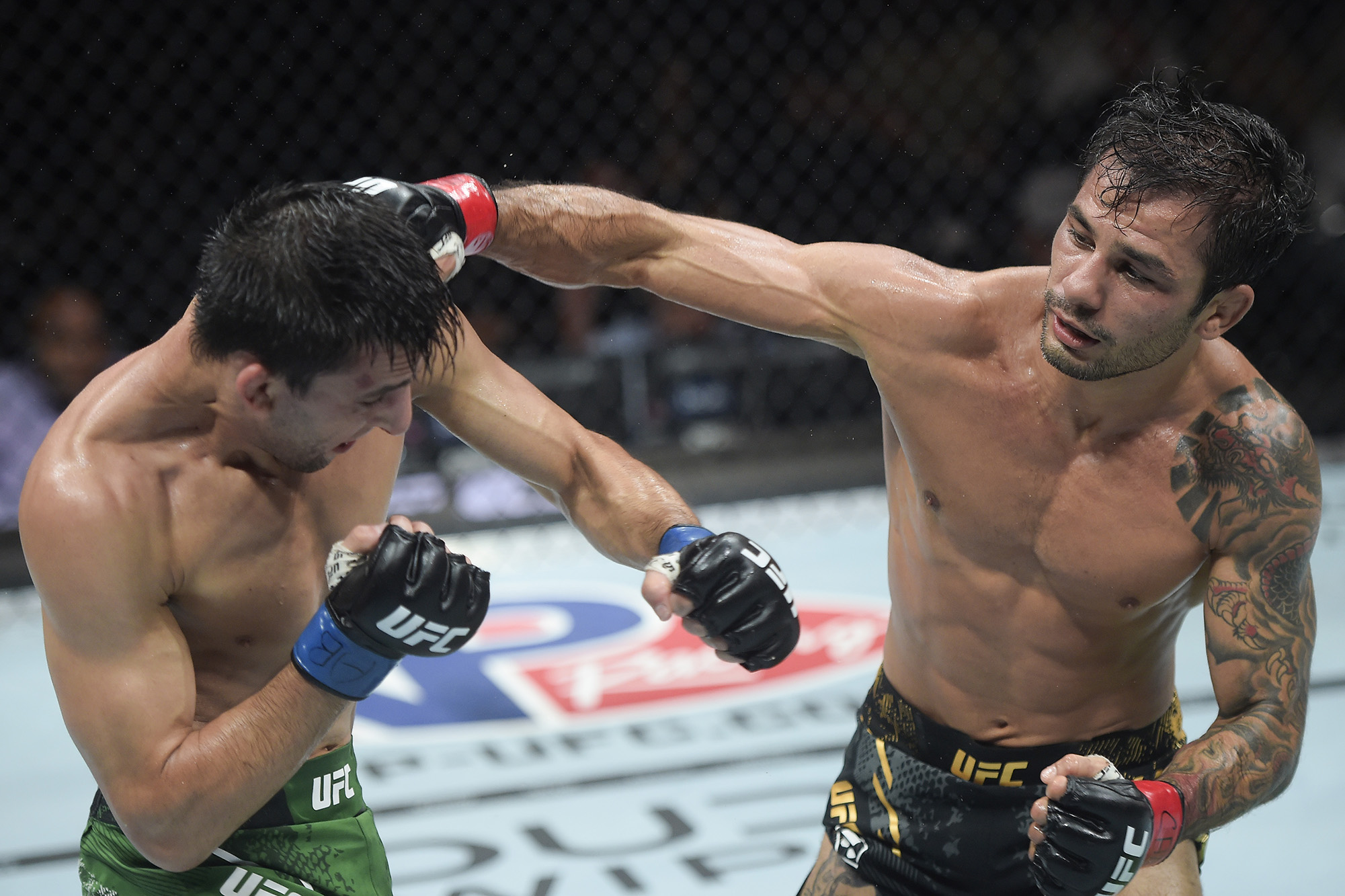
The littlest guys got to stand tall Saturday in an octagon headliner.
Only time will tell if the UFC returns the men’s flyweight championship to co-main status.
And for those who stump for more prominent placement of the 125-pounders, Alexandre Pantoja’s successful title defense against Steve “Don’t Call Me Carell” Erceg at UFC 301 wasn’t the home run that would have helped its case. To extend the baseball metaphor, Pantoja-Erceg was more of a slap single.
Generally, it’s not for lack of thrills that flyweights fail to feature atop the billing when the UFC and broadcast partner ESPN aim to pry away your $79.99 — oof, hurts every time to process the 2024 pay-per-view price. Over the first 24 flyweight title fights (including interim) in UFC history, 15 of them earned some form of Fight/Performance/Knockout/Submission of the Night bonus.
Make that 15 of 25 after Pantoja picked up a solid, mildly entertaining unanimous decision victory in his hometown of Rio de Janeiro but left Farmasi Arena without the disclosed $50K bonus many a cash-strapped UFC fighter has begged for from UFC CEO Dana White.
Pantoja is a humble champion who wants to do right by his weight class. Speaking with The Post in the leadup to the fight, he voiced a desire to stay active in his own division rather than chase the allure of a second glittery-gold belt up at 135 pounds … with the caveat that he’d happily settle an old personal score with current bantamweight champ Sean O’Malley if the opportunity arose.
“I have a huge line in the flyweight [division],” Pantoja points out, accurately, given the likes of Amir Albazi and Muhammad Mokaev present fresh challenges and are ranked ahead of Erceg.
All of that is commendable. Personally, I’m all about that. But none of it on its own creates a heaping helping of consumer demand for Pantoja title defense.
Rarely has the UFC placed flyweights front-and-center on the PPV fight poster, the division champion’s name above all others. That’s, in part, because the UFC almost always will put the heaviest weight class’ title fight in the headlining spot when more than one belt is up for grabs. Part of it comes from the fact that eight championship fights headlined on network TV or cable.
Only once has the UFC made a committed effort to force-feed flyweight title fights as headline attractions on pay-per-view. As Demetrious Johnson entered the third year of his record-setting reign as the inaugural champion, he’d been a go-to guy to close out “big” Fox fight cards. Seemingly, the hope was that Johnson’s wide exposure on actually-free TV would create a star who could get fans to say “shut up and take my money.”
Well, fans never shut up, but they did not part with their cash to watch Johnson’s next four defenses as the star attraction on PPV. Worth noting: 2014, when two of these occurred, was a notably weak year for UFC pay-per-view business in the time right before Conor McGregor attracted a new generation of MMA fans.
In the nine years between Johnson’s final PPV headliner — a second win over John Dodson — and Pantoja’s triumphant return to Brazil, only two more numbered events would entrust the final fight of the night to flyweights: two events separated by one month and headlined by new champion Deiveson Figueiredo. The last one was a Fight of the Year draw against Brandon Moreno that spawned the UFC’s only championship tetralogy (or quadrilogy, if you prefer). The other three matchups in the thrilling series played second fiddle.
Which brings us back to Brazil on Saturday night, with the honorable champ Pantoja facing a guy who wasn’t even on the worldwide radar let along the UFC roster 12 months ago, one who all agree looks like the scion of Michael Scott from “The Office” and revealed himself in recent weeks to be an endearingly quirky addition to the flyweight mix.
“Endearingly quirky” might not be the best way to extract $80 after two straight months of spoiling fight fans with juiced-to-the-gills UFC 299 and UFC 300.
Neither UFC nor ESPN tends to reveal its buy rates, and the days of leaked numbers ended when the Worldwide Leader moved all PPV purchases under its umbrella. As such, good luck getting a good answer as to how well this show did relative to similarly less-stacked events — outside of Jose Aldo’s triumphant return to both the UFC and to the place that earned him the nickname “The King of Rio,” UFC 301 was largely bereft of star power and top-contender matchups.
Odds are good that flyweights return to being second bananas to their bigger brethren when Pantoja puts his belt up for grabs next, perhaps in the fall. You never know, though, given the UFC’s proclivity for doing anything — including needless creation of interim belts — to advertise a title fight; maybe they need gold on the poster in a pinch.
As an appreciator of the little guys, I’m happy any time they get the spotlight all to themselves.
As a realist, forgive me for not holding my breath.














